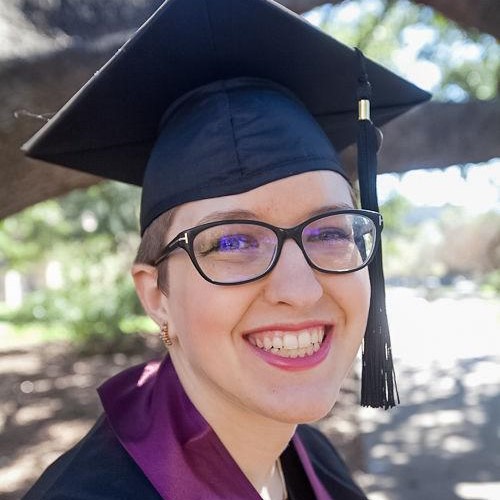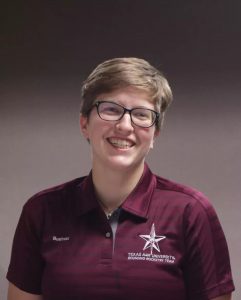Next up: NASA
A Q&A with graduating Telecommunication Media Studies student, Andrea Lloyd, who heads to work for NASA after graduation.

A Q&A with graduating Telecommunication Media Studies student, Andrea Lloyd, who heads to work for NASA after graduation.
Why did you choose to major in telecommunication media studies?
I actually entered the university as a math major. The plan was to write math textbooks by having a math major and an English minor. I ended up switching to a communication major after my first semester and have enjoyed it ever since. I have two certificates as well, one in strategic communication (aka public relations) from the Department of Communication and one in professional writing from the Department of English.
I’ve learned an array of skills including coding, technical writing, photography, and research methods. One of the original reasons I chose a B.S. in communication was it didn’t require a foreign language, but it has truly turned out to be the perfect fit for me. I can combine the quantitative and scientific side of my brain (the part that had me originally pursuing a math degree) through research and coding, while still satisfying the qualitative and creative side of my brain through other skills like writing and event planning.
What will your internship with NASA look like?
My internship is with the communication department at NASA Langley located in Hampton, Virginia. It is primarily focused in public relations… I will be helping plan and execute the 50th anniversary of the Apollo 11 mission. I’ve been working on similar projects with Dr. Bonnie J. Dunbar, planning for the Association of Space Explorers’ Planetary Congress for next fall.
Ever since I was a kid I wanted to work for NASA (primarily to be an astronaut). When I switched from mathematics to communication, I simply assumed I couldn’t work for NASA or any science organization. A Texas A&M Alumni, Josh Byerly, visited one of my classes and completely changed my perspective. Byerly was a spokesperson and “voice of NASA.” After his presentation, I began digging into what opportunities NASA had for communication majors. Evidently, there is a lot of opportunities! It makes sense really, because someone has to communicate the science to the public so they can understand the importance of the work that NASA does. From then going forward, the NASA internship was on my radar.
What are you most excited about for your internship?
What I am most excited about is taking things that I have learned here at Texas A&M and applying them to real-world scenarios in the workforce. In addition to that, I can help further a cause I really enjoy–helping support science literacy for the public.
There never seemed like a good opportunity to take this internship. After some unexpected changes in my life, however, I found myself here for the fall 2018 semester. I decided to apply for the internship because I didn’t have any immediate plans after graduation, due to wanting to pursue graduate school. When NASA gave me a few offers, I was ecstatic! I chose NASA Langley because it best aligns with my interest and future career in science public relations.
How did studying in the College of Liberal Arts help prepare you to be successful in this future position?
Studying at the College of Liberal Arts has prepared me by giving me opportunities to become a more rounded individual. I have had opportunities to pursue independent studies in topics that interest me, help with some research projects, and find my niche in the world. Before finding public relations, I felt like I just had a hodgepodge of skills. I knew photography, I excelled at writing, I could generally make a podcast, I did well in social media. I just felt like a jack of trades, master of none. Finding public relations helped match all of these interests to a career path that I didn’t know existed even entering college. With the help of a liberal arts degree I have been able to expand my knowledge base, find some specialization, and find a career path I enjoy.

Andrea Lloyd
What will you miss the most about Texas A&M?
When I first got here, I would tell you I chose Texas A&M because of their amazing science and mathematics programs that I was keen on pursuing. Why I stayed at Texas A&M, even when my first plan didn’t pan out, is because I found a community that I felt like I had a role in.
There will be much missed about Texas A&M, but most importantly the traditions! How do I greet someone without saying “Howdy?” I have thoroughly loved participating in every tradition over the years including Bonfire Remembrance, late nights in Evans, and serving the community.
What are your dreams and goals for the future?
My immediate future goals include attending a graduate program to pursue a masters in science communication. I hope this additional education will help expose me to more knowledge and opportunities in the science public relations field. In the long term, I would love to work for a science institution, such as an aquarium, space agency, or other organizations. I want to continue to help the public understand science so they can understand why it is important for us as human beings to discover the wonders of the world we live in. The education I have received at Texas A&M will be invaluable to this pursuit by being a foundation for my future education, learning how to reach and communicate with different kinds of people, and remembering the traditions that make this university so unique.
